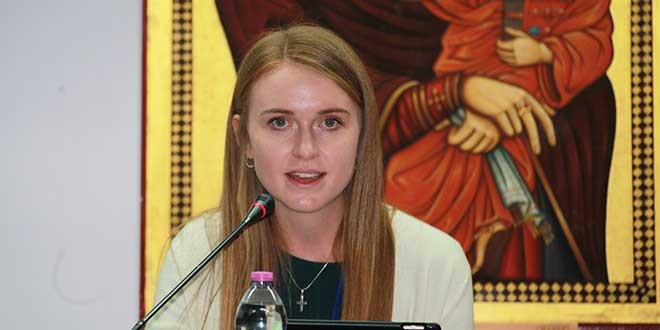Ashleigh from Australia tell us about her experience of faith

It is an honour to be here today to share my desires and expectations for the upcoming Synod of Bishops on Youth, Faith and Vocational Discernment. While many of my desires are shaped by my personal faith journey and my experience as a social worker, I also carry with me the specific hopes and desires of 15,000 of my fellow young Australians who recently completed the Youth Synod Survey, created by the Australian Catholic Bishop’s Conference. I will focus specifically on the data from the my own Diocese of Broken Bay, which was gained through both the National Online Survey and live consultations with young people from across the diocese.
But let me begin with a story from home. Last month I was on a bush walk with my grandmother in the Blue Mountains, an ancient, rugged region west of Sydney. My grandmother is active, both in body and in spirit and she has a special ability to find beauty and wisdom in the simplest things. Last month as we were walking in the bush near her house, we passed a fallen tree. The tree looked as if it had fallen some time ago, but was flourishing with new, green foliage along the length of the fallen trunk. As we passed the fallen trunk, my Nan said something that struck me. She said, “New life has come from that fallen tree because it’s roots are still in the ground.” I took a closer look at the tree and noticed that its roots were entrenched in the earth more firmly than even some of the trees nearby that were still standing. No wonder this tree was flourishing. It was fallen but it was alive. And significantly, new life was forming along the whole length of the tree trunk, in places perhaps where foliage doesn’t normally grow…
Our Church in Australia is in a time of crisis and transition. In the midst of scandal and confusion, many turn to anger or even reject the Church altogether. But like the fallen tree, now is the time to root ourselves even more firmly in Christ, to be patient and to maintain hope. My overarching desire is that as young people we maintain our roots firmly in Christ, while being open to new life in unexpected places. And more significantly, my hope is that the Synod facilitates and models this approach.
In our recent National Synod Survey, young people were very clear on the places and issues with which the Church needs to become more involved. Top on the list of issues facing young people in Australia was mental health. In the survey comments, many young people indicated that the Church could assist them and their friends with mental health, along with some of the other major issues they face, which were identified as school and study, body image and drugs and alcohol. As a social worker with disadvantaged young people who have lived through trauma, I witness the effects of mental illness in young people on a daily basis. In Australia today, suicide is the leading cause of death in people aged 15–24 and accounts for 31% of deaths in this age category. It is no secret that mental health becomes more difficult to manage with isolation and loneliness. So, with the increasing number of young people spending evenings and weekends in front of phone screens behind closed doors, the mental health concerns that were raised in the survey come as no surprise. It is here that the Church is in a prime position to provide community and to offer an alternative to the aloneness that is accepted as normal by many young people today. Many respondents to our National Survey identified spaces such as “Theology in the Pub,” youth rallies and festival style events as places where their experience of community is nourished, alongside Mass and liturgical gatherings. There is also great scope for the Church to facilitate talks and social justice projects that deal specifically with the issues that young people identify as important. In light of the stigma that is associated with mental health, if the Church is to meet the needs of the people, it is our responsibility to address issues such as mental health without hesitation and to bring them to light in the public arena.
A number of young people in the survey commented that clergy and parishioners often have difficulty relating to young people. It is my view that young people need to be loved and embraced for their unique gifts, and not simply for being the token young person in their parish. While we use the term “young people” as an umbrella term, with Australia’s multiculturalism and diversity, young people need to be recognised for all the facets of their personal identity, and not just their youth. I recall a particularly powerful experience of a priest’s engagement with an Aboriginal young person who I work with. One month ago this young person was living on the streets. She had run away from her group home and her mental health was at a low point. After two weeks of sleeping in bus shelters, hotels and friend’s couches, I met up with her at her aunt and uncle’s place. Her aunt and uncle were Aboriginal elders in their community, and were very worried for their niece who was rejecting all forms of help and human contact. As we sat by the fire at her aunt and uncle’s house that night, they reminded her of Fr Paul, a priest this girl had known her whole life. The aunt and uncle then began to tell me stories about the way Fr Paul had been present for significant cultural ceremonies in this young person’s life. The girl then recalled some Easter liturgies that were led by Fr Paul, which took place at sunrise in the mountains, on land that was special to the local Aboriginal community. I could sense, by the way this young person spoke, that this was a priest who really understood her. While he wasn’t Aboriginal himself, he had taken the time to immerse himself in the local Aboriginal community and has subsequently played a significant role in this young person’s life.
It is fitting that “openness to others” is one of the key themes of this seminar. One of the biggest deterrents to young people’s full engagement in the Church is the perception that the Church is “closed” to people who are different or who hold views that do not align with Church teaching. It is my experience that many young people give up on the Church before even giving it a go, out of fear that they cannot engage in open, honest discussion about the issues that matter to them. This year I was involved in facilitating the “Synod video booth” in my Diocese. The booth travelled around to various youth events in the Diocese, and young people were invited to answer the question, “If you had one minute to say anything to Pope Francis, what would you say?” As a facilitator of this booth, I remember one young person who, upon being asked this question hesitated and told me, “I’d better not say what I really think. My views are too radical to share at Church.” After five minutes of encouraging this girl to openly share her thoughts, she went ahead and shared her experience of topics such as homosexuality and transgender issues being shut down at her Catholic School. I was really struck by this young person’s experience of the disconnect between Church and the rest of the world. It was as if there were some matters that were out of bounds in Church settings, yet these were the issues that she was most passionate about and which gave her life. Similar sentiments were shared in the online survey, with comments such as: “We push aside [issues] pretending they’re not as important as they are. We need to focus on what is important in our society today…” The Church can still maintain its stance on key issues, while welcoming young people whose views don’t necessarily align. If young people feel that Church is a place where they are loved and welcomed regardless of their background, their identity and their stance on social issues, our Church will become a much more vibrant place. As a Church, if we are to walk in the footsteps of Jesus, we need to be a Church that engages with those on the margins, and which includes young people who may feel ostracised for their views and identity.
Today I would also like to share some of my expectations for the upcoming Synod in terms of its process and procedure. In meeting with my Bishop Peter A Comensoli from the Diocese of Broken Bay prior to this forum, he reminded me that the Synod is not simply an event but a process and a journey. A Synod should not be about forcing decisions, but rather about initiating processes and ensuring that these processes incorporate the honest voices of the local Churches. In Pope Francis’ homily at the opening Mass for the 2014 Synod on the Family, he said that “Synod assemblies are not meant to discuss beautiful and clever ideas, or to see who is more intelligent. They are meant to better nurture and tend the Lord’s vineyard, [and] to help realise His dream.” As a young person, I admire some of the procedural changes that were initiated at the 2014 Synod, such as the hour of “free discussion” every evening where bishops were invited to respond to what they heard during the day. Rather than relying on prepared speeches, this small change encouraged real interaction. As we draw closer to the 2018 Synod on Youth, I have a procedural suggestion: In addition to the official meeting of the Synod fathers, invite a large group of young people from diverse cultures and walks of life to meet simultaneously in Rome next year as the Synod assembly meets. Discussion topics at the youth gathering could mirror the discussion topics at the Synod assembly, and short film clips could be put together at the end of each day at the youth gathering to be shared the following morning at the Synod assembly. There could even be scope for live video-links between the two gatherings and for technology to be used creatively. I feel this opportunity will allow the Synod fathers to openly engage not only with the data gathered in the lead up to the assembly but also directly with young people.
In our National Synod Survey, young people seemed to recognise the Church’s effort to listen but were at times frustrated by the Church’s ability to do so. Significantly, from the results of the online survey, on a scale of 1-10 with 10 being very positive, young people in Australia score the Church’s listening ability to be 6 out of 10. My hope is that through this Synod process young people feel listened to by the Church in a way that is unprecedented. My hope is that young people are empowered to speak boldly, to speak clearly and to speak their minds. Our Church doesn’t look like it did 50 years ago. Now is the time to be creative. Now is the time to pay attention to where along the tree trunk new life is growing, and to respond with an open heart.
By: Ashleigh Green, Australia
Presentation for International Seminar on Young People
11th September 2017




